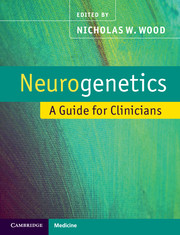Book contents
- Neurogenetics: A Guide for Clinicians
- Neurogenetics: A Guide for Clinicians
- Copyright page
- Contents
- Contributors
- Chapter 1 The human genome project – what it really means and where next
- Chapter 2 Genetic counseling and genetic testing for neurogenetic disorders
- Chapter 3 Alzheimer's disease and related dementias
- Chapter 4 The epilepsies
- Chapter 5 The ataxias
- Chapter 6 Huntington's disease
- Chapter 7 Parkinsonism
- Chapter 8 Prion diseases
- Chapter 9 Channelopathies
- Chapter 10 Amyotrophic lateral sclerosis and other disorders of the lower motor neuron
- Chapter 11 The muscular dystrophies
- Chapter 12 Charcot–Marie–Tooth diseases
- Chapter 13 Mitochondrial disorders
- Chapter 14 The neurofibromatoses and related disorders
- Chapter 15 The future of neurogenetics
- Index
Chapter 6 - Huntington's disease
Published online by Cambridge University Press: 05 May 2012
- Neurogenetics: A Guide for Clinicians
- Neurogenetics: A Guide for Clinicians
- Copyright page
- Contents
- Contributors
- Chapter 1 The human genome project – what it really means and where next
- Chapter 2 Genetic counseling and genetic testing for neurogenetic disorders
- Chapter 3 Alzheimer's disease and related dementias
- Chapter 4 The epilepsies
- Chapter 5 The ataxias
- Chapter 6 Huntington's disease
- Chapter 7 Parkinsonism
- Chapter 8 Prion diseases
- Chapter 9 Channelopathies
- Chapter 10 Amyotrophic lateral sclerosis and other disorders of the lower motor neuron
- Chapter 11 The muscular dystrophies
- Chapter 12 Charcot–Marie–Tooth diseases
- Chapter 13 Mitochondrial disorders
- Chapter 14 The neurofibromatoses and related disorders
- Chapter 15 The future of neurogenetics
- Index
Summary
Keywords
- Type
- Chapter
- Information
- NeurogeneticsA Guide for Clinicians, pp. 64 - 82Publisher: Cambridge University PressPrint publication year: 2012
- 1
- Cited by



